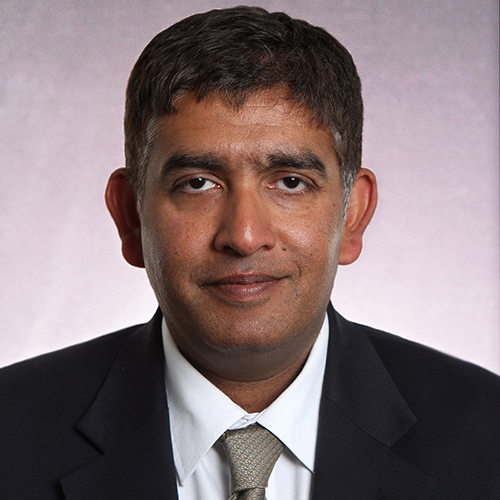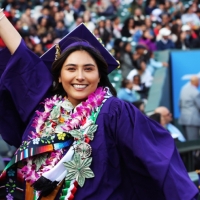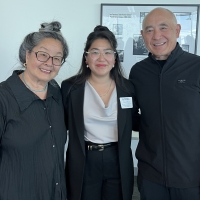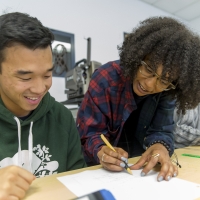Last July, Eugene Sivadas, Ph.D., became Dean of the Lam Family College of Business. Prior to joining San Francisco State, Dean Sivadas was a faculty member of the University of Washington Tacoma for 15 years, where he also held several administrative positions such as Associate Dean and Director of the MBA program. He held several faculty governance positions there as well, including a seat in the three-campus faculty senate and chairing the campus-wide tenure promotion committees. Dean Sivadas holds a Ph.D. in Marketing from the University of Cincinnati and has held faculty appointments at Rutgers Business School, the University of Cincinnati, and Emerson College. He received an M.A. degree in Marketing Communications from Emerson College and a B.A. in Economics from the University of Delhi in Delhi, India.
We recently sat down with Dean Sivadas to learn about his perspectives on leading the Lam Family College of Business and his hope of seeing San Francisco State as a laboratory for creating a new kind of business school.

Eugene Sivadas, Ph.D.
Q: Welcome to your new role as Dean of the Lam Family College of Business! Please tell us what drew you to San Francisco State University and what motivated you to take the position of dean of the college?
A: I’m very happy to be here! There are quite a few things that drew me to San Francisco State University. I believe that this is an amazing school that has a lot of potential to grow because of its size and breadth of offerings. This college even goes beyond most business schools, because we have a hospitality and tourism department and we do labor studies, in addition to the traditional business disciplines. It’s also located in an amazing city that is a hotbed of innovation and home to a lot of businesses and industries. For business schools, being near a lot of high-profile companies is a big deal. And of course, the mission of the school itself and the students that it caters to means that it’s a place that transforms lives.
As a college, we can contribute to a profession through building knowledge and teaching. However, as a dean, you have the opportunity to shape a college for the benefit of the students and the faculty. I believe that this college has the potential to rewrite the script of what it means to be a truly exceptional business school because of its size, its location, and the other ingredients it has. It is a school with tremendous potential that's not fully harnessed.
I would like to see SF State become a kind of laboratory for creating a new kind of business school, because of its size and scale and its great mission of social justice. It has a very high-quality faculty who were trained at the best universities in the world. Together, these factors give us the opportunity to build an unconventional kind of business college that is unique and exceptional. It will not mimic other more elite business schools which are typically focused on rankings, student selectivity, and prestige from research. We're going to create something high-quality, accessible, and innovative, which is connected to a great city – a hotbed of innovation in the tech industry, finance, biotech, and nonprofits, among others.
The goal is not to make the Lam Family College of Business into a “Berkeley light”, but to create a really happening business school that gives the students, many of whom are first-generation, from immigrant families, from underrepresented communities, an education that is comparable to the leading business schools.
Q: What do you see as the key elements to growing the college?
A: For one, I would like to find a greater niche in the executive education context – to reach out more and engage the business community and continue to build out our development council.
I believe that the Chris Larsen and Lyna Lam Funds for the Lam Family College of Business are a big draw. A college named after a living alumnus, where an alumnus can endow a school during their lifetime is quite a rarity. This gift makes the school a more exciting place overall and allows us to innovate. It takes money to innovate, you have to invest, and the Lam-Larsen gift allows the college the ability to invest and experiment, do more for the students and the faculty, and to engage more with the community. It will mean the creation of more programs, especially in the FinTech, blockchain, innovation, and entrepreneurship spaces, in addition to the focus it funds on emerging markets. These improvements will undoubtedly make the college more of a destination school and a college for more students. Ultimately, I think we will want to grow our undergraduate and graduate programs as well.
Q: What is the value that the Lam Family College of Business brings to San Francisco and the local community?
A: First, students can get a good education locally, without traveling outside their communities. Second, we are a source of expertise for a lot of smaller and mid-sized businesses and enterprises in this community.
San Francisco State is the city’s university – the university of the people. We are not a neutral kind of university that might be the same whether it is located here or 2000 miles away, because we have a very special location. So building on that theme, I’d like us to cement our partnerships with the community, and leverage those connections to build stronger, healthier career services and internship pipelines to provide our students with more opportunities for experiential learning and networking.
Q: How do you feel that your expertise and background in marketing will play out in your new position?
A: At the end of the day, marketing is about two things: customer retention and customer creation. At San Francisco State, I’ll utilize my professional and educational training to make the college more customer-focused – and the customers are not just the students, but also the faculty and the staff. The goal is to create a sense of excitement in and about the college.
Second, we will be focusing on building the brand of the school. We have a brand, but we want to make it a greater brand. We've created seven five-member taskforces comprised of faculty, staff, students, alumni, and community members. After in-depth conversations with my colleagues and reading a lot of historical documents, I've identified seven priorities, and four of the priorities really have a marketing emphasis on them. One priority is to see how we can build the LFCoB brand further. The second is on fundraising, the third is community engagement, and the fourth is on curricular innovation. I think the fundamental thing we want to look at is, what is our product? What is the value proposition that we are offering to the marketplace and how do we differentiate ourselves?
We hope to explore different things, including partnerships with other colleges to create more innovative programs that are a bit more out of the box, that might draw more students and give them some unique offerings. I think potentially partnering with the design school, the school of film studies, and the engineering school would offer some awesome options.
One of the things that I've had some brief conversations about, for example, is with the College of Ethnic Studies. We also have a labor studies program in our college. COVID-19 and the racial equality protests that we’ve seen stress the importance for companies to understand diversity issues and labor challenges because the pandemic has highlighted the divide between the more affluent professional classes and the frontline workers. With our expertise in these areas, we can explore offering training programs to the industry and create some unique curricula in these areas.
Q: What are your hopes for the college’s fundraising committee? What are your fundraising goals?
A: We have talented faculty, many of whom are very entrepreneurial. But we need to be able to offer them resources so that they can excel in their work. Fundraising can provide those resources. I would like to see more endowed professorships for high-quality researchers and educators to motivate the faculty and energize them. I also always look for scholarship support for students and perhaps support student organizations so that we can send our students to competitions, where they can measure themselves against the very best and enhance the reputation of our school.
I’d like to work with the committee to think outside the box and identify additional sources of funding in the community. I’d also like us to connect with alumni to help in fundraising and in connecting our students with jobs and mentorships. Many of our students are first-generation, and they may not have received training before in how to navigate the corporate world and know what kind of career opportunities there are.
What I can say to any donor is that the students coming here can get a world-class education at a very reasonable price. And your gifts will go to enhancing the quality of education the students get. I do believe that we have a very good business school, and we transform lives to a large degree. I want to see more magic, and that magic will come from the funding they donate.



